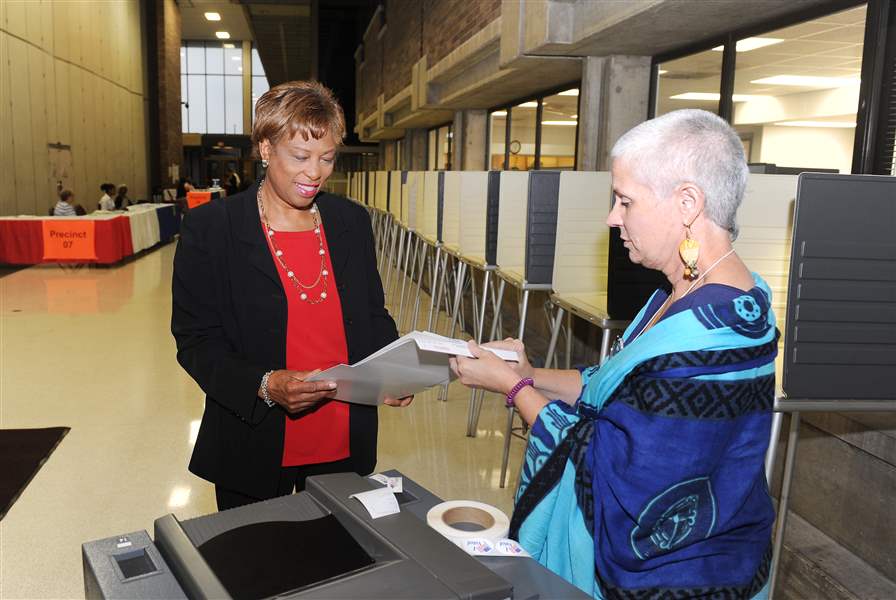
GOP incumbent congressman trails in Michigan
8/5/2014
Southfield Mayor Brenda Lawrence hands her ballot to Precinct Chairman Penny Scharmberg at Southfield City Hall on Tuesday, Aug. 5, 2014. Lawrence, a Democrat, is running for the 14th Congressional District vacated by U.S. Rep. Gary Peters. (AP Photo/Detroit News, Max Ortiz) DETROIT FREE PRESS OUT; HUFFINGTON POST OUT
ASSOCIATED PRESS
DETROIT — A Republican congressman trailed an establishment-minded rival in early Michigan’s primary election returns today and a second GOP congressman faced a stiff challenge as voters began a changing of the guard in the state’s congressional delegation that also included choosing nominees in four open seats, the most vacant U.S. House districts in 22 years.
The ballot also had scores of legislative races and a lone statewide proposal but no showdowns in races for governor and U.S. Senate. Republican Gov. Rick Snyder will face Democratic challenger Mark Schauer in November, while the GOP’s Terri Lynn Land will square off against Democratic U.S. Rep. Gary Peters for a Senate seat.
Closely-watched House races included business-backed challenges to conservative tea party-inspired congressmen on opposite sides of Michigan.
Two-term Rep. Justin Amash in the Grand Rapids area faced a threat from investment adviser Brian Ellis, who loaned his campaign $1 million. In early returns, one-term Rep. Kerry Bentivolio — who won in 2012 after a Republican incumbent was knocked off the ballot due to fraudulent petition signatures — was trailing lawyer David Trott, who kicked in $2.4 million to his campaign, in suburban Detroit.
“I live in his district and never see him,” said Ralph Martin, 76, of Livonia, who voted for Trott over Bentivolio. “I couldn’t even form an opinion of him.”
But Steve Hall, 59, of Livonia, said he voted for Bentivolio partly because he is “down to earth, a regular kind of guy.”
Voters also began the process of filling four seats that incumbents will leave at year’s end.
Rep. John Dingell, a Dearborn Democrat who has been in Congress for a record 58 years, will retire along with Republicans Reps. Dave Camp of Midland and Mike Rogers of Howell. A fourth House seat is opening up because Peters of Bloomfield Township is running for the Senate seat held by retiring Democrat Carl Levin.
It is the most open seats since 1992, when redistricting, retirements and a primary upset ushered out seven of 18 House members.
Four Democrats, including former Rep. Hansen Clarke and Southfield Mayor Brenda Lawrence, vied to replace Peters.
Businessman Paul Mitchell loaned or gave his campaign $5 million to run against state Sen. John Moolenaar and Peter Konetchy in the GOP primary for Camp’s Republican-leaning district in central Michigan.
The Republican primary in Rogers’ GOP-leaning seat, which stretches from Lansing to the northern Detroit suburbs, featured former state Senate Majority Leader Mike Bishop and state Rep. Tom McMillin.
Republican Reps. Fred Upton and Tim Walberg in southern Michigan also had primary challengers. So did GOP Rep. Dan Benishek in northern Michigan and longtime Democratic Rep. John Conyers of Detroit.
The Rev. Horace Sheffield III, a Detroit pastor, hoped to do something no politician has done: unseat Conyers.
Joie Canty, 52, cast her ballot for Sheffield, though she said she had voted for Conyers in the past.
“Horace Sheffield can bring something new to the table or just add to what Conyers has already started,” she said.
With a win in his Democratic-heavy district, Conyers would be well on his way to succeeding Dingell as the current longest-serving member of the House.
And Dingell’s wife, Debbie, was expected to extend the Dingell dynasty beyond its 81-year run since she faced nominal opposition in his Democratic seat that covers Ann Arbor and the “Downriver” working-class Detroit suburbs. She was up big in early returns. Before John Dingell held the seat, his father John Dingell Sr. represented the district for 22 ½ years.
The only statewide ballot measure was a proposal written by the Legislature asking voters to endorse a funding mechanism designed to ensure local governments and schools are fully reimbursed as taxes are gradually slashed on businesses’ personal property such as machines. The plan — which would not raise taxes — received broad bipartisan support from lawmakers, Snyder, the business community and groups representing counties, cities and townships.